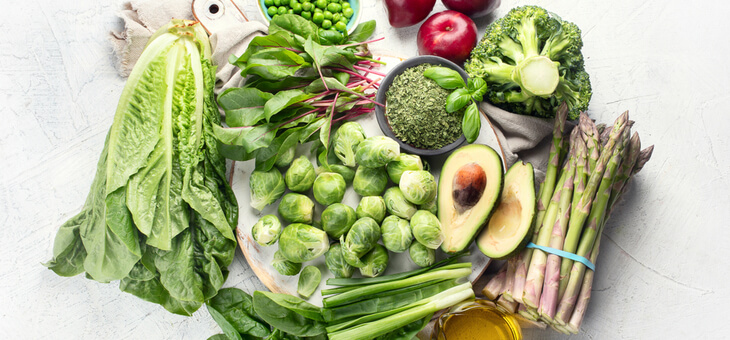Vitamin K is a fat-soluble vitamin found in two forms. The first, phylloquinone, is found in green leafy vegetables such as collard greens, kale, and spinach. The second, menaquinone, is found in some animal foods, fermented foods and can also be produced by bacteria in the body.
Read: Interesting ways to boost your vitamin C intake
Vitamin K helps to make various proteins that are essential for blood clotting and good bone health. Osteocalcin is one important protein necessary for healthy bone tissue that requires vitamin K for production.
Vitamin K is found throughout the body, including in the liver, brain, heart, pancreas, and bone. A deficit can lead to excessive bleeding from small injuries and a higher risk of bone fractures.
People typically get enough vitamin K in their normal diet, but antibiotics may cause a deficiency by killing the gut bacteria that produce it. In this case, your doctor may recommend supplements.
The normal doses of dietary vitamin K and oral supplements are generally safe. Doses as high as 10mg K1 and 45mg K2 (MK-4) per day have been tested in clinical trials without toxic effects.
However, mild side-effects such as nausea, diarrhoea and stomach upset have been reported.
It rarely reaches toxic levels in the body because it is broken down very quickly and excreted in urine or stools. Increasing your dietary vitamin K intake is generally safe, but some synthetic forms of this vitamin need to be monitored closely, especially when taken with other medications such as anticoagulants.
Vitamin K may be helpful for those at risk of dementia
As people age, the risk of developing dementia increases. Now, a study from Al Maarefa University in Saudi Arabia indicates that vitamin K may help protect against “cognitive deterioration”. The study, presented at the Experimental Biology meeting in April, tested giving a vitamin K supplement to rats.
Since vitamin K can affect brain functioning, the researchers in this study wanted to see how it affects cognitive functioning in rats. The researchers conducted a 17-month long trial on rats. One group received a vitamin K supplement, and the other did not.
The researchers administered menaquinone-7 (MK-7), which the authors note “is a major form of vitamin K2”.
The rats went through a series of cognitive functioning tests throughout the study to assess their cognition level, anxiety, and depressive-like behaviour.
By the end of the study, the rats that received the vitamin K supplements had reduced levels of cognitive impairment, depression, and anxiety. Additionally, the authors note that these rats experienced “improved spatial memory and learning ability”.
“Vitamin K2 demonstrated a very promising impact in hindering aging-related behavioural, functional, biochemical, and histopathological changes in the senile aging brain,” says Professor Mohamed El-Sherbiny.
Read: What the science says about multivitamins
Here are eight ways to make sure you’re getting enough vitamin K
1. Eat plenty of leafy green vegetables. Kale, spinach, and collard greens are all excellent sources of vitamin K1.
2. Stock up on other vegies too. Leafy greens aren’t the only source of dietary vitamin K. Brussels sprouts and broccoli are packed with it, giving you about 110 micrograms per half-cup serving. Other good vegie choices are spring onions, asparagus, raw watercress, and green cabbage.
3. Include animal products in your diet. Chicken, beef, and pork are all good sources of vitamin K2.
4. Eat fermented foods such as yoghurt, sauerkraut, and kimchi that are rich in vitamin K2.
5. Cook with a different oil. Soybean and canola oil are rich in the most common form of vitamin K, phylloquinone. One tablespoon of soybean oil has about 25 micrograms of vitamin K and the same amount of canola oil has about 10 micrograms.
6. Take a supplement. Have your vitamin K levels checked, and if you are not getting enough of it through diet alone, consider taking a supplement.
7. Choose nuts as a snack. Nuts are packed with protein, fibre, healthy oils, and other key nutrients that fight inflammation and keep your heart strong. Cashews, mixed nuts, and pine nuts are good sources of vitamin K. Sprinkle pine nuts over a salad or add cashews to a tasty stir-fry.
Read: Just a handful of nuts and seeds every day could save your life
8. Try cooking with frozen vegies. The amount of vitamin K you get from foods depends on how you prepare them. Fruit and vegies that are flash-frozen when picked often have more than raw forms. This is likely because frozen vegetables lose some of their water, which concentrates the vitamins.
If you enjoy our content, don’t keep it to yourself. Share our free eNews with your friends and encourage them to sign up.
Disclaimer: This article contains general information about health issues and is not advice. For health advice, consult your medical practitioner.

